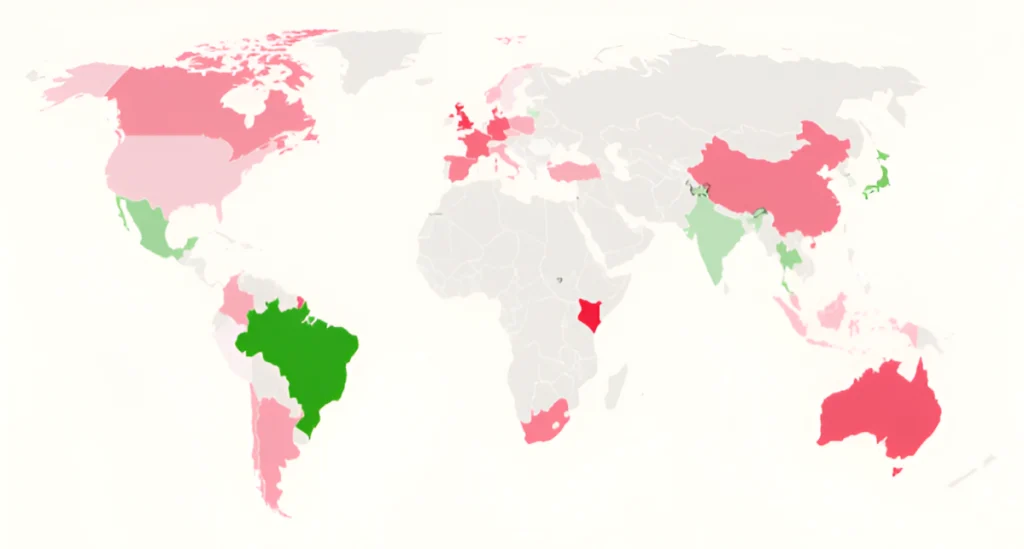Climate Concerns Dip as Global Crises Compete for Attention
In a world grappling with multiple crises, climate change appears to be losing ground in the public consciousness of many nations. A comprehensive survey conducted by the Forest Stewardship Council (FSC) in partnership with Ipsos has revealed a shifting landscape of global concerns, with war, economic hardship, and disease increasingly taking precedence over environmental worries in the United States, China, and numerous Western countries. The study, which gathered responses from 40,000 individuals worldwide, found that the proportion of people ranking climate as a top concern has fallen from 34.5 percent in 2022-23 to 32.3 percent in 2024. Meanwhile, conflict-related concerns have surged from 43.2 percent to 48.4 percent during the same period. This trend isn’t universal, however, as climate anxiety has actually intensified in countries like India, Brazil, and Japan, revealing a complex global tapestry of environmental priorities shaped by regional contexts and immediate challenges.
“People are just juggling multiple crises,” explains Subhra Bhattacharjee, director general of the FSC. “In addition, in the face of policy uncertainty globally, my feeling is that there is also an illusion of the sense of agency that we can do something about it.” This sentiment points to a troubling disconnect between the scientific reality of climate change—with 2024 likely being the first year with temperatures exceeding 1.5 degrees Celsius above pre-industrial levels—and the public’s perception of the issue. The United Nations has consistently characterized climate change as “the defining issue of our time,” warning of disrupted weather patterns that threaten food production and rising sea levels that endanger coastal communities. Yet this message seems to be losing urgency in the public mind, particularly in Western nations that have already implemented climate policies that have proven economically challenging. “Upfront climate action is not painless,” Bhattacharjee acknowledges. “That information needed to have been shared more transparently. That discourse means that political support for these difficult decisions tends to decrease.”
The implications of this attitudinal shift could be profound for international climate cooperation. As world leaders prepare to convene in Belem, Brazil, for the UN’s COP30 climate talks—marking a decade since the Paris Climate Agreement—diminishing concerns about climate change in key nations may undermine the prospects for coordinated global action. This trend potentially strengthens the position of climate skeptics like former and potentially future U.S. President Donald Trump, who has dismissed climate change as a “scam” and “the greatest con job ever perpetuated.” However, Bhattacharjee cautions against attributing the shift to any single political figure, describing it instead as “a pattern of a general escalation in climate denial across the world, not just in one country.” The survey reveals that while climate concerns have indeed declined in the United States, they’ve fallen even more dramatically in Western Europe—ironically, a region that has taken substantial action to address climate change through renewable energy initiatives, which have subsequently driven up costs and strained economies.
The survey’s findings suggest a critical need to reframe climate communication strategies. “We need to meet people where they are and discuss climate in terms of what it means for daily lives, what it means in terms of concrete action, and be very upfront about what the costs are, but what benefits it will bring,” Bhattacharjee emphasizes. This pragmatic approach acknowledges that abstract discussions about climate science may be failing to connect with people’s immediate concerns. “Catalyzing climate action has to be driven by concrete day-to-day realities of people’s lives. We cannot talk in concepts anymore,” she adds. The information overload and competing narratives surrounding climate change appear to be creating confusion and uncertainty, making it difficult for individuals to determine what’s truly important and where they should focus their attention and efforts.
Despite the declining prominence of climate concerns, the survey offers some encouraging insights. Environmental consciousness remains strong globally, with 72 percent of consumers still preferring products that don’t harm plants or animals. This suggests that while explicit climate anxiety may be diminishing, broader ecological awareness continues to influence consumer behavior and values. Additionally, a recent UN Food and Agriculture Organization report indicates that the rate of forest loss has decreased since the 1990s, with forest area actually increasing in Asia, Europe, and North and Central America, though continuing to decline in South America and Africa. This demonstrates that environmental progress is possible, even as public attention fluctuates between various global crises.
Looking ahead, the geopolitical landscape presents significant challenges for climate action. With mounting security concerns stemming from conflicts in Europe, the Middle East, and potential confrontations in Asia—coupled with persistent economic and trade uncertainties—international cooperation on climate issues may be increasingly sidelined. This is particularly likely if the United States adopts a stance strongly opposed to climate initiatives. The reality may be that individual countries will need to focus more on adaptation to climate change rather than coordinated mitigation efforts, regardless of whether the most severe predictions from climate scientists ultimately materialize. As Bhattacharjee notes, “A lot of ongoing narratives, competing narratives, are leaving people in a space where they don’t know which version is really true.” In this environment of information overload and eroding trust, climate advocates face the daunting task of rekindling public engagement with an issue that, despite its declining prominence in surveys, continues to reshape our planet in profound and lasting ways.


